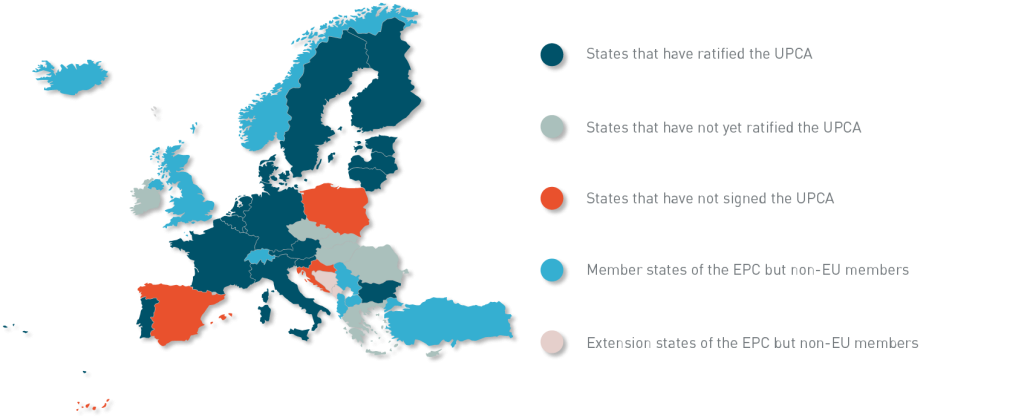Unitary Patent and Unified Patent Court
The Transition to a Unitary Patent (UP) and a Unified Patent Court (UPC) in Europe has begun and this has entered force from Thursday 1st June 2023. Please download our quick reference guide for an overview.
The information below is subject to change and this page will be updated whenever new announcements are made.

The intention of the Unified Patent Court and Unitary Patent system is to create a standard protection for patents across participatory EU Member States via the submission of a single application to the European Patent Office. This will change the post-grant procedure of European Patents, streamlining protection by removing the need for national validation and translation within countries that have signed up to the new system. It will also be maintained through the EPO via the payment of a single annual fee.
It is comparable, although not identical, to the framework in place for the longstanding EU Trademark (EUTM) and Registered Community Designs (RCD), in that the goal of unification would be to make the application process easier, more cost effective and the plan is to, eventually, make it EU-wide.
It will still be possible to validate and protect an EP patent in individual EPC member states, including those who do not join the UPC under the current system. The new UPC will have jurisdiction over both Unitary Patents and traditional nationally validated European patents. However, EP patents can be specifically opted out from the UPC regime, unlike a UP, which cannot. Having a single court for infringement and revocation actions should make the process by which a patent owner can enforce the patent across the EU much easier, theoretically reducing potential litigation costs.
The map above shows the countries who have presently deposited instruments of ratification, which means that they are now bound by the rules of the court, which entered into force on 1st June 2023.
The EPO began transitional measures on January 1st 2023, meaning that it was possible to defer grant and file an early request for unitary effect. The sunrise period, where you were able to opt-out EP patents from the UP/UPC system prior to launch, started on 1st March 2023 and ran for three months. It is still possible to opt out but only if no legal action has been brought before the UPC.
We have formed a UP/UPC expert team who are positioned to handle all related queries based on currently available knowledge and we encourage you to reach out to them at upc@zacco.com with any queries or portfolio specific questions you may have about the future of your patent rights in Europe.
The Court entered into force on Thursday 1st June 2023.
There are several Courts of First Instance of the UPC and the locations of these are spread across contracting member states.
Patent proprietors will have the option to choose to convert their granted EP into a Unitary Patent one month after the patent has been granted for all the contracting member states. This can be selected by filing in a request for unitary effect. For EPC states that are non-EU member states, or are EU member states but have not yet signed and ratified the Unified Patent Court Agreement (UPCA), the patent may be validated in the same way as it is today.
If a UP has been requested then it will replace the effects that an EP patent entails in the states that have ratified the UPCA at the date the EP patent is granted.
There is no simple answer and the decision about whether to opt-out or not is a complex one for any patent owner. We recommend you reach out to the expert UPC team at Zacco to discuss your particular the particulars of your patent situation – upc@zacco.com
Patent holders will have the option to opt-out their EP patents, provided no legal action has been taken against them in national courts. Unless opted out, the granted patents are automatically included in the UPC jurisdiction for the contracting member states. It should be noted, however, that during the transitional period of seven years the EP patent could potentially also be litigated in national courts.
Should a patent owner decide to opt-out, they can later change their mind, but only if no court proceedings have been brought against the patent. For example if an action has been brought that ties the patent to litigation before a national court, then the opt-out could not be withdrawn. On the other side of this, should an action be started against a patent at the UPC before a decision has been made to opt-out, then that will tie the patent to the UPC jurisdiction.
It will also be possible to opt-out EP applications so that they are automatically opted out after grant.
In principle, opting out will prevent an action being started before the UPC by another party which, as discussed above, would tie that patent to the UPC. Once a decision to opt-out has been made, if the patent owner then decides to opt-in, there will be no opportunity to opt-out again.
The predicted workload and expectations for the UPC to function in a procedurally efficient manner are both factors currently being taken into account by parties considering litigation.
It is important to consider the practical and financial implications of either choice, and Zacco can help you to assess the benefits and pitfalls of the decision.
Zacco can assist you with opting out one or more EP patents from the jurisdiction of the UPC by registering your request with the UPC Registry.
Opt-outs can only be applied for by, or on behalf of, all the patent owner (co-owners must apply for an opt-out together).
At present, licensees have limited opportunities to influence the decision unless this has previously been agreed as part of any contract. If you are a licensee, we encourage you to urgently seek clarification of the patent owner’s intentions as their decision could potentially have a significant impact on your use of said rights. Similarly, patent owners should create a dialogue with other stakeholders or licensees to discuss their intentions because any decision could have repercussions on later disputes, particularly if it is considered a contributory factor in the dispute itself.
There are many things to consider in deciding how to proceed. Zacco can help you to assess potential benefits and update you with any new information about the implementation of the UP/UPC new system. Our expert UPC team will be able to advise you on your particular situation, including:
- Some background into the UP/UPC system and what it means for your current EP patent rights
- Preparing strategies and activities to ensure optimal use of the new system once launched
- Why might your organisation opt out and other decision-making strategies
- Pros and cons of selecting a Unitary Patent over a conventional EP patent
- How will the new system impact existing and future license agreements
- Selecting the new Unified Patent Court over National Courts for future litigation
- Exploring the economic implications of your portfolio, including potential damages and patent valuations as business assets
We will assist you in taking a step back to develop a comprehensive overview of your portfolio, advising you on the extent of your patent protection and the nature of your competition in both current and potential markets. We are also able to advise on whether the benefit of collectively enforcing your patents across contracting member states will outweigh the risk of them being collectively revoked.
There are still many questions, and few of them are easy to answer, but decisions will have to be made as the UP/UPC system entered force on Thursday 1st June 2023.
Perhaps you are considering whether to pursue unification of your patent families, or maybe exploring whether it makes sense to opt-out of the UPC jurisdiction during the initial seven year transition period following launch. Either way, our expert team is in the perfect position to answer all of your questions as well as advise you on your general IP strategy. For more information, email the team at upc@zacco.com and we will be happy to talk you through your available options.
Zacco ran a webinar in September 2022 detailing many of the facts that were known about the UPC and UP at the time. You can find the webinar embedded below.
Talk to us
We are available to discuss your options and the implications of deciding to opt-out or to join the new system. For more information reach out to your contact at Zacco or one of the UPC expert team below. You can also email us at upc@zacco.com.
Torbjörn Axelsson
Senior Partner
European Patent Litigator
Gothenburg
Peggy Bengtsson
Director Portfolio Outsourcing Copenhagen, MalmöLouisa Dahlin Friberg
Manager Validations, Renewals and Annuities
Copenhagen
Anders Fredriksson
Senior Partner
European Patent Litigator
Copenhagen
Nils Köster
Partner
Certified IP Lawyer
Bremen
Lotta Norberg
Senior Partner
European Patent Litigator
Linköping
Camilla Rendal Nielsen
Senior Partner
Patent Director, Region Denmark & Germany
Copenhagen







